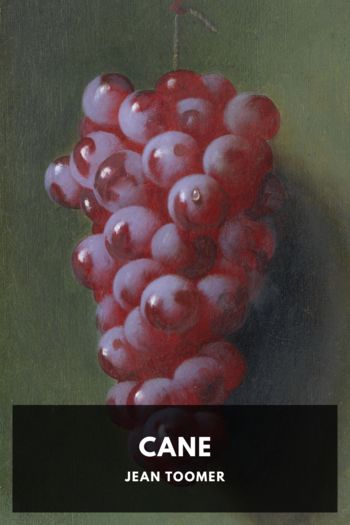Cane - Jean Toomer (top 50 books to read txt) 📗

- Author: Jean Toomer
Book online «Cane - Jean Toomer (top 50 books to read txt) 📗». Author Jean Toomer
Barlo pauses. Old gray mothers are in tears. Fragments of melodies are being hummed. White folks are touched and curiously awed. Off to themselves, white and black preachers confer as to how best to rid themselves of the vagrant, usurping fellow. Barlo looks as though he is struggling to continue. People are hushed. One can hear weevils work. Dusk is falling rapidly, and the customary store lights fail to throw their feeble glow across the gray dust and flagging of the Georgia town. Barlo rises to his full height. He is immense. To the people he assumes the outlines of his visioned African. In a mighty voice he bellows:
“Brothers an sisters, turn your faces t th sweet face of the Lord, an fill your hearts with glory. Open your eyes an see th dawnin of th mornin light. Open your ears—”
Years afterwards Esther was told that at that very moment a great, heavy, rumbling voice actually was heard. That hosts of angels and of demons paraded up and down the streets all night. That King Barlo rode out of town astride a pitch-black bull that had a glowing gold ring in its nose. And that old Limp Underwood, who hated niggers, woke up next morning to find that he held a black man in his arms. This much is certain: an inspired Negress, of wide reputation for being sanctified, drew a portrait of a black madonna on the courthouse wall. And King Barlo left town. He left his image indelibly upon the mind of Esther. He became the starting point of the only living patterns that her mind was to know.
IISixteen.
Esther begins to dream. The low evening sun sets the windows of McGregor’s notion shop aflame. Esther makes believe that they really are aflame. The town fire department rushes madly down the road. It ruthlessly shoves black and white idlers to one side. It whoops. It clangs. It rescues from the second-story window a dimpled infant which she claims for her own. How had she come by it? She thinks of it immaculately. It is a sin to think of it immaculately. She must dream no more. She must repent her sin. Another dream comes. There is no fire department. There are no heroic men. The fire starts. The loafers on the corner form a circle, chew their tobacco faster, and squirt juice just as fast as they can chew. Gallons on top of gallons they squirt upon the flames. The air reeks with the stench of scorched tobacco juice. Women, fat chunky Negro women, lean scrawny white women, pull their skirts up above their heads and display the most ludicrous underclothes. The women scoot in all directions from the danger zone. She alone is left to take the baby in her arms. But what a baby! Black, singed, woolly, tobacco-juice baby—ugly as sin. Once held to her breast, miraculous thing: its breath is sweet and its lips can nibble. She loves it frantically. Her joy in it changes the town folks’ jeers to harmless jealousy, and she is left alone.
Twenty-two.
Esther’s schooling is over. She works behind the counter of her father’s grocery store. “To keep the money in the family,” so he said. She is learning to make distinctions between the business and the social worlds. “Good business comes from remembering that the white folks dont divide the niggers, Esther. Be just as black as any man who has a silver dollar.” Esther listlessly forgets that she is near white, and that her father is the richest colored man in town. Black folk who drift in to buy lard and snuff and flour of her, call her a sweet-natured, accommodating girl. She learns their names. She forgets them. She thinks about men. “I dont appeal to them. I wonder why.” She recalls an affair she had with a little fair boy while still in school. It had ended in her shame when he as much as told her that for sweetness he preferred a lollipop. She remembers the salesman from the North who wanted to take her to the movies that first night he was in town. She refused, of course. And he never came back, having found out who she was. She thinks of Barlo. Barlo’s image gives her a slightly stale thrill. She spices it by telling herself his glories. Black. Magnetically so. Best cotton picker in the county, in the state, in the whole world for that matter. Best man with his fists, best man with dice, with a razor. Promoter of church benefits. Of colored fairs. Vagrant preacher. Lover of all the women for miles and miles around. Esther decides that she loves him. And with a vague sense of life slipping by, she resolves that she will tell him so, whatever people say, the next time he comes to town. After the making of this resolution which becomes a sort of wedding cake for her to tuck beneath her pillow and go to sleep upon, she sees nothing of Barlo for five years. Her hair thins. It looks like the dull silk on puny corn ears. Her face pales until it is the color of the gray dust that dances with dead cotton leaves …
IIIEsther is twenty-seven.
Esther sells lard and snuff and flour to vague black faces that drift in her store to ask for them. Her eyes hardly see the people to whom she gives change. Her body is lean and beaten. She rests listlessly against the counter, too weary to sit down. From the street someone shouts, “King Barlo has come back to town.” He passes her window, driving a large new car. Cutout open. He veers to the curb, and steps out. Barlo has made money on cotton during the





Comments (0)